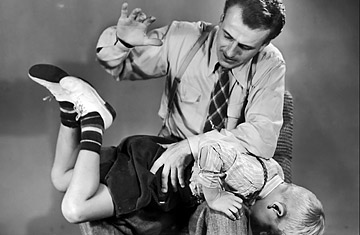
The debate over spanking goes back many years, but the essential question often evades discussion: Does spanking actually work? In the short term, yes. You can correct immediate misbehavior with a slap or two on the rear end or hand. But what about the long-term impact? Can spanking lead to permanent, hidden scars on children years later?
On Sept. 25, a sociologist from the University of New Hampshire, Murray Straus, presented a paper at the International Conference on Violence, Abuse and Trauma in San Diego suggesting that corporal punishment does leave a long-lasting mark — in the form of lower IQ. Straus, who is 83 and has been studying corporal punishment since 1969, found that kids who were physically punished had up to a five-point lower IQ score than kids who weren't — the more children were spanked, the lower their IQs — and that the effect could be seen not only in individual children but across entire nations as well. Among 32 countries Straus studied, in those where spanking was accepted, the average IQ of the survey population was lower than in nations where spanking was rare, the researcher says.
In the U.S., Straus and his colleague Mallie Paschall of the Pacific Institute for Research and Evaluation looked at 1,510 children — 806 kids ages 2 to 4, and 704 ages 5 to 9 — and found that roughly three-quarters had endured some kind of corporal punishment in the previous two weeks, according to interviews with the mothers. Researchers measured the children's IQ initially, then again four years later. Those kids who hadn't been spanked in the initial survey period scored significantly better on intelligence and achievement tests than those who had been hit. Among the 2-to-4-year-olds, the difference in IQ was five points; among the older kids, there was a 2.8-point gap. That association held after taking into account parental education, income and other environmental factors, says Straus.
So how might getting spanked on the butt actually affect the workings of the brain? Straus notes that being spanked or hit is associated with fright and stress; kids who experience that kind of trauma have a harder time focusing and learning. In another recent paper that he co-authored with Paschall, Straus writes that previous research has found that even after you control for parental education and occupation, children of parents who use corporal punishment are less likely than other kids to graduate from college.
Still, it's not clear if spanking causes lower cognitive ability or if lower cognitive ability might somehow lead to more spanking. It's quite possible that kids with poor reasoning skills misbehave more often and therefore elicit harsher punishment. "It could be that lower IQ causes parents to get exasperated and hit more," Straus says, although he notes that a recent Duke University study of low-income families found that toddlers' low mental ability did not predict an increase in spanking. (The study did find, however, that kids who were spanked at age 1 displayed more aggressive behavior by age 2 and scored lower on cognitive development tests by age 3.) "I believe the relationship [between corporal punishment and IQ] is probably bidirectional," says Straus. "There has to be something the kid is doing that's wrong that leads to corporal punishment. The problem is, when the parent does that, it seems to have counterproductive results to cognitive ability in the long term."
One problem with Straus' data is that some of the parents who tended to spank may also have been engaging in actual physical abuse of their children. Researchers define corporal punishment as physical force intended to cause pain — but not injury — for the purpose of correcting a child's behavior, not simply hurting him. Studies have shown that very few parents who use corporal punishment also beat their kids, but Straus can't rule out the possibility that his data are confounded by the presence of child abuse, which past research has shown to affect victims' development.
The preponderance of evidence points away from corporal punishment, which the European Union and the U.N. have recommended against, but the data suggest that most parents, especially those in the U.S., still spank their kids. On the basis of his international data, collected by surveying more than 17,000 college students in various countries, Straus found that countries with higher GDP tended to be those where corporal punishment was used less often. In the U.S., the tendency to hit also varies with income, along with geography and culture; it's most common among African-American families, Southern families, parents who were spanked as children themselves and those who identify themselves as conservative Christians.
But overall the percentage of parents who spank has been steadily declining. Straus says that in 1968, 94% of Americans told surveyors they agreed with spanking. By 2005, the proportion who said it is "sometimes O.K. to spank a child" had fallen to 72%, although most researchers believe the actual incidence of corporal punishment is higher.
The practice has its defenders, and Straus himself admits, with chagrin in his voice, that he spanked his own son. In the 1990s, the American Academy of Pediatrics underwent a bitter fight before finally declaring in 1998 that "corporal punishment is of limited effectiveness and has potentially deleterious side effects."
Sometimes spanking seems like the only way to get through to an unruly toddler. But the price for fixing his poor short-term conduct might be an even more troublesome outcome in the future.
